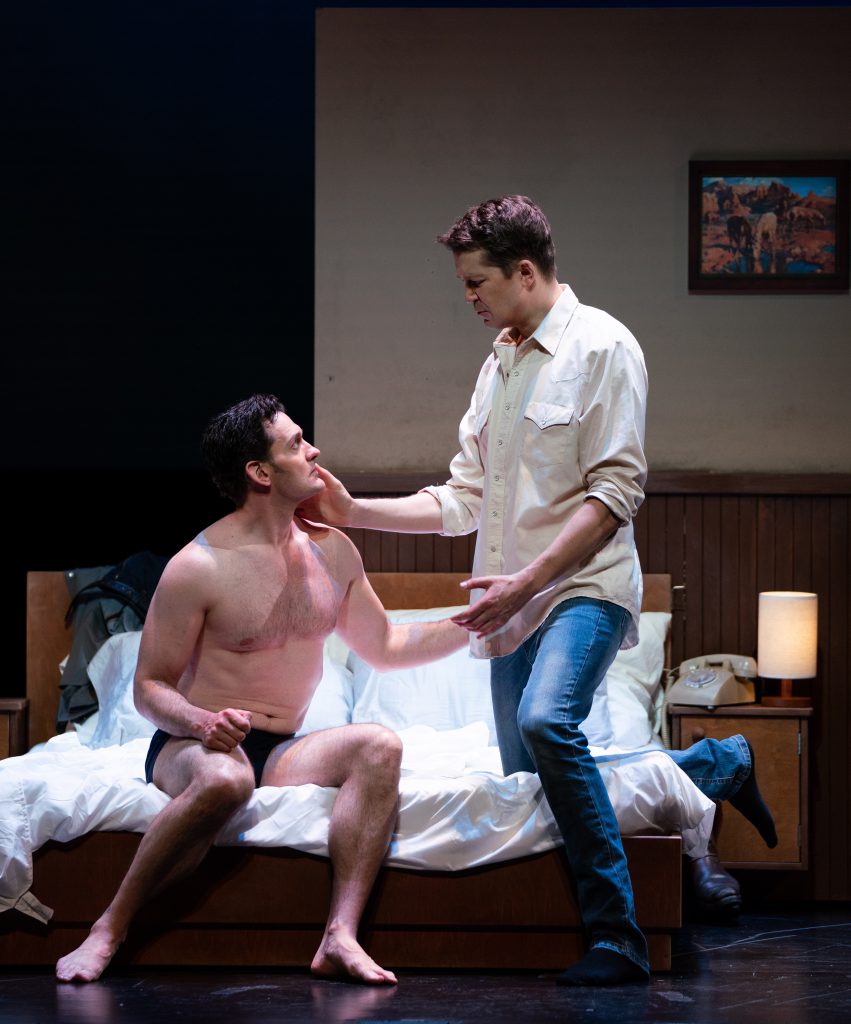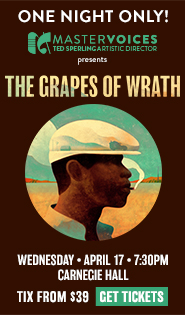Wuorinen’s dreary music puts passion on ice in NYCO’s “Brokeback Mountain” premiere

Glenn Seven Allen (left) and Daniel Okulitch in the U.S. premiere of Charles Wuorinen’s “Brokeback Mountain” at New York City Opera. Photo: Sarah Shatz
Brokeback Mountain, the opera, has finally come home. Originally commissioned by New York City Opera, the scheduled debut was a casualty of then–general director Gerard Mortier’s sudden flight to Madrid’s Teatro Real, where the piece received its first performances in 2014. On Thursday night, the work made its way back to NYCO for its American premiere at the Rose Theater, in a staging and reduced orchestration first given at the Salzburg State Theater in 2016.
Wuorinen’s opera is based on the 1997 short story of the same name by Annie Proulx, which was in turn made into the acclaimed 2005 film. At the time, a blockbuster movie that treated a gay romance so candidly challenged still-strong American taboos, and the film achieved an almost iconic status, hailed by critics for its courage and emotional power.
It’s odd, then, that Wuorinen’s opera feels as cold as it did in Thursday’s performance. The strongest point of the piece is its sympathetic libretto, written by Proulx herself. Though it feels at times that Proulx has tried to pack too much into her narrative, she gives us aching portraits of people for whom love is a constant source of grief. The opera’s most poetic moments come in the exchanges between the two hard-nosed ranchers Ennis and Jack, as they struggle to understand their romantic relationship and square it with their self-perceptions.
Alas, Wuorinen’s music is rarely up to the task of filling out the text. In his dreary twelve-tone score it is often hard to find the connection between what’s coming out of the pit and what’s transpiring onstage. Whether the scene shows the characters hitting each other, embracing on the mountainside, trying on dresses, or fighting in the kitchen, his score offers general tension and jagged movements, and not much else.
There is somewhat more variety, at least, in the vocal characterizations of the different roles: Ennis speaks in short, compact bursts, especially early on, while Jack is brighter and more open. Even so, eventually each character begins to sound the same—Ennis’s vulnerable admission that “you got some kinda power over me” is cut from the same musical cloth as such humdrum observations as “I better get up there, I guess.”
There is a conversational quality to this writing that intrigues at first, but soon leaves the listener wanting a more searching musical voice, which appears only rarely, as in the rich, harmonically tart duet for the two cowboys, weaving their voices tightly together before they have to part for the first time; or in Ennis’s brief, warm lullaby to his two daughters. The keen expressive sense shown in these moments would have served the piece well, had Wuorinen employed it more consistently.
The superb singing actors in these NYCO performances make the most of these opportunities. Daniel Okulitch, who plays Ennis Del Mar, created the same role in the 2014 premiere in Madrid, and his interpretation of the character is richly drawn. Ennis has the harder time of the two reconciling his masculine self-image with his feelings for another man; his is an emotionally rough journey, as he doesn’t allow himself to pursue the life he truly wants until it is too late. Okulitch’s warm, wooly bass-baritone is the ideal instrument to explore both the gruff and the tender sides of the role, used to greatest effect in his crushing final monologue, part apology and part lament.
Glenn Seven Allen’s Jack Twist is both a foil and a complement, bringing a bright, sometimes airy tenor to his performance. Jack is intense and confident in his love for Ennis, urging his partner to let go of his apprehensions and build a life together, but to no avail. Allen’s portrayal is irrepressibly energetic, to the point that his absence late in the second act becomes almost as vivid as his earlier presence.
While the love of these two men, and their sadness—particularly Ennis’s—at not being able to realize it fully, is the opera’s motivating force, the story also shows us the collateral damage experienced by others in their lives, particularly their wives. Alma Beers, Ennis’s long-suffering wife, who divorces him and tries to find love again, was played by Heather Buck with a fine, focused soprano of light caramel color. As Lureen, Hilary Ginther showed a firm, dark mezzo-soprano, and impressive emotional depth, imploring the ghost of her father for forgiveness when it turns out he had been right about Jack, after all.
Christopher Job’s rough power made him a supporting standout as the herd-owner Aguirre. Kristee Haney charmed with her motherly concern as Mrs. Beers, while Sarah Heltzel brought a bright, almost piercing mezzo as the saleswoman trying to sell Alma her wedding dress. The Twists, Jack’s parents, were especially impressive—Kevin Courtemanche with his harsh bark and Jenni Bank with her earthy mezzo and soulful singing.
Kazem Abdullah and the NYCO orchestra didn’t have the most lush score to work with, but they gave a fine performance nonetheless, playing tightly and creating a pervasive chill in the music.
The Salzburg production, directed by Jacopo Spirei, hides most of Jack and Ennis’s physical intimacy from view, which makes it a little too abstract to bring the passion of the relationship alive for the audience. Still, the staging on the whole is effective, based on rolling set modules designed by Eva Musil, managing to be nimble while still giving enough detail to establish a strong sense of place.
Brokeback Mountain will be performed 2 p.m. Saturday, 4 p.m. Sunday, and 7:30 p.m. Monday at Jazz at Lincoln Center’s Rose Theater. nycopera.com


